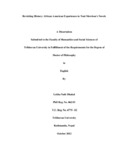Please use this identifier to cite or link to this item:
http://archive.nnl.gov.np:8080/handle/123456789/489| Title: | Revisiting history : African American experiences in Toni Morrison's novels |
| Authors: | Dhakal, Lekha Nath |
| Keywords: | Toni Morrison African American--History Toni Morrison--Trilogy War and politics |
| Issue Date: | 10-Jun-2018 |
| Abstract: | Toni Morrison is a prominent voice in African American literature. Her writings engage history, community, slavery, love, survival, racial and sexual politics. It is through these universals that she deals with rewriting history, re-assessing cultures, investigating and confronting stereotypes of what it means to be black or white as well as what it means to be man and woman in the United States of America. She justifies the presence of African community in her novels which address the lives of African American people in different historical periods. Morrison sees herself as an agent in the empowerment of her people through the rediscovery of their history. Her focus is historic and her goal is the rediscovery of the African past lost through slavery in America. In examining her legacy, she expects to reach a higher level in the understanding of herself. Her themes are no longer specific to herself or to her group, but they have become universal ones. They address disruptive families and challenge modern times. Her novels have a complex relationship to history; they are, in a sense, historical novels in which the characters are images of the people who survived the African-American history in America. Morrison’s work resonates with her interest in recuperating a black American history recording and representing the musical and lived voices of the people. It also explores the relationships of power between the white and black and between men and women. She uses historical moments of joy and importance in black history, many of which have been hidden from the conventional history books which mainly concentrated on white, male, middle - class histories. Morrison re-interprets past and re-centers it on black experience. Morrison also looks at other period in black history: the Harlem Renaissance in New York, its roots and the roots of the people in the countryside, the 1930s, in Jazz. When the Jazz Age arrived it gave African Americans new opportunities for success. Musical and other talents were recognized enabling to hope, to gain fame and also to move into a more materialistic society. This latter issue is partly what goes wrong with the age. Morrison tackles and explores racism, both overt and covert, the later ignoring people their rights, needs and histories, and silencing them through refusing to give them a voice with the vote, with publication or with reportage in the press. In Jazz, murder goes unreported as it happens in black community and the mainstream press finds it unimportant. Jazz captures and re-imagines a historical and cultural moment. It restores a largely absent black history and gives different perspectives and scrutinizes everyday African American life. It deals with lies, suffering, male-female relationships and the role of music. Morrison writes in a predominately realistic mode whose narrative structure posits whites and constructs blacks as “Other” in American society--a society where the question of race is still unanswered. African-American culture in her work is more specific to her position as an African-American mythographer. The past is an integral part to the legacy of African Americans. It links up them to their glorious heritage. The history of America has been written from the perspective of the dominant whites that has degraded and distorted the presence of blacks in America. The history of America will remain incomplete if the voices of the margins are not heard. The study answers to the questions: how does Morrison, by taking historical persona (African American victims of racist ideology), reconstruct the dominant presence of blacks in America through her fiction? The objective of this study is to observe how Morrison’s novels transform what has been a significant absence in the narrative of American history--the exploitation and denial of black cultural identity--into a powerful presence. It observes how Morrison presents American history from a black perspective creating a voice and identity out of a confrontation with the dominant white American discourse. This study has used New Historicism as theoretical tools to analyze Morrison’s six major novels—The Bluest Eye, Sula, The Song of Solomon, Beloved, Jazz, and Paradise. The use of New Historicism as theoretical tools is relevant in this study as it considers works of literature as historical texts, and refigures the relationship between texts and the cultural system in which they are produced. The study has proved that Morrison has given a significant space to African Americans by connecting them to their history and making them articulate boldly their unburied past, powerful present and making the dominant white society to recognize them as an integral part of America. It is qualitative and in embedded form. |
| Description: | A dissertation submitted to the Faculty of Humanities and Social Sciences of Tribhuvan University in fulfillment of the requirements for the degree of Doctor of Philosophy in English, 2012. |
| URI: | http://103.69.125.248:8080/xmlui/handle/123456789/489 |
| Appears in Collections: | 800 Literature & Rhetoric |
Files in This Item:
| File | Description | Size | Format | |
|---|---|---|---|---|
| 55- Dr,Lekha nath Dhakal.pdf | 851.8 kB | Adobe PDF |  View/Open |
Items in DSpace are protected by copyright, with all rights reserved, unless otherwise indicated.